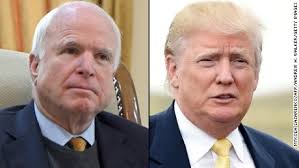Consternation and confusion overtook Capitol Hill on Tuesday as Republicans confronted the revelation that President Donald Trump had disclosed highly classified information to the Russians. Several hours later, lawmakers were shaken anew by reports that the president had asked then-FBI Director James Comey to stop investigating ousted adviser Michael Flynn.
Armed Services Committee Chairman John McCain said late Tuesday that the developments had reached “a point where it’s of Watergate size and scale.”
“I think we’ve seen this movie before,” the Arizona Republican said at a dinner to receive the International Republican Institute’s Freedom Award. “The shoes continue to drop, and every couple days there’s a new aspect.”
McCain said Trump needs to “get it all out … and the longer you delay, the longer it’s going to last.” His comments were reported by The Daily Beast.
Yet despite the anxiety and displeasure voiced by McCain and a handful of other prominent GOP lawmakers, Republicans did not appear poised to abandon a president who remains critical to their goals of acting on health care and tax legislation. Several came to his defense and sought to close ranks.
“There isn’t anybody who can run the White House without criticism,” said Sen. Orrin Hatch of Utah, a senior lawmaker. “This man has been subject to more criticism than any predecessor that I know of. They hate him, they didn’t like the fact that he won, he beat their favorite, it was a remarkable election.”
Senate Majority Leader Mitch McConnell responded tersely “no” when pressed on whether he had concerns about the president’s ability to handle classified information, or whether he was losing confidence in Trump.
But McConnell acknowledged that “it would be helpful to have less drama emanating from the White House.”
Just the opposite happened over the course of Tuesday.
First Republicans faced questions on a report initially published in the Washington Post that Trump last week shared details about an Islamic State terror threat with Russian Foreign Minister Sergey Lavrov and Russian Ambassador to the U.S. Sergey Kislyak.
As some Republicans defended Trump and others expressed concerns, another bombshell report landed, this time about a memo where Comey wrote that Trump had asked him to shut down an FBI investigation into Flynn, according to a person familiar with the situation. The White House denied what was first reported by The New York Times.
Republicans, caught off-guard, insisted they wanted to hear from Comey, who was fired last week a day before Trump met in the Oval Office with the Russian diplomats.
“Let’s get to the bottom of what happened with the director. And the best way to get to the bottom of it is for him to testify … I’m not going to take a memo, I want the guy to come in,” said Sen. Lindsey Graham, R-S.C.
Democrats badgered Republicans to stand up to the president, and demanded access to the transcripts of Trump’s meeting last week with two Russian diplomats. After the news broke of the Comey memo, Minority Leader Chuck Schumer, D-N.Y., stood in the chamber and said, “I say to all of my colleagues in the Senate — history is watching.”
Yet as the House came back into session Tuesday night some Republicans from conservative districts said their constituents were not overly concerned with any aspect of the Russia story.
Addressing the Comey memo, GOP Rep. Blake Farenthold of Texas said: “If Comey felt like the president was trying to obstruct justice, Comey would have been duty-bound to report it to the DOJ and act on it. And we’re not hearing that happened. I think this is another example of whatever Trump does gets the worst possible spin.”
House Republicans were to hold a weekly meeting Wednesday morning after which Speaker Paul Ryan, R-Wis., was expected to address the matter. Aides have said he hopes for a full explanation from the White House.
Democrats pointed out that Ryan had called for Democrat Hillary Clinton to be denied classified briefings after Comey concluded last year that she was careless in how she handled classified information over her email accounts. Ryan’s aides countered that in the same July 2016 opinion piece, Ryan also said those classified briefings could resume if Clinton were actually elected.
With the White House in chaos and congressional Republicans struggling to respond, communication appeared to have broken down between the two ends of Pennsylvania Ave.
Senate Intelligence Committee Chairman Richard Burr, R-N.C., said around midday Tuesday that he’d spent the morning trying to get someone at the White House to call him and explain what had actually happened.
“My major concern right now is that I don’t know what the president said,” Burr said. “I’d like to think somebody from the White House who was in the room is going to get on the phone and tell me what they said. … Maybe they’re busy.”














